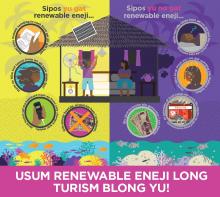GIZ RE & Tourism Pilot Program Report
This report capture the key lessons learned from the implementation of a pilot study which tested subsidized and sustainable renewable energy and energy efficiency models within the private tourism sector. These lessons are intended to assist with the analysis and development of innovative & sustainable business models to increase access to renewable energy and energy efficiency for small-scale tourism operators in Vanuatu.Overall project objectives were to successfully pilot a subsidized ‘Dealer Model’ for distributing renewable energy technologies to the private sector, specifically in the high tourism area of North Efate and nearby islands of Nguna, Pele and Emae. The intention was to sustainably increase the use of renewable energy and energy efficiency lighting systems among off-grid rural tourism operators. Furthermore, the pilot was to support the Government of Vanuatu’s National Energy Road Map (NERM), Green Growth Policy and priorities from the Vanuatu Strategic Tourism Action Plan (VSTAP) in promoting the use of renewable energy and energy efficiency in Vanuatu’s tourism sector. These goals were accomplished through exploring the characteristics of the rural tourism industry that would allow for introducing renewable energy sustainably. Tourism leads Vanuatu’s formal economy, and contributed nearly 50% of the Vanuatu’s GDP in 2014. As this contribution is expected to increase by 4.5% per annum to 58% of GDP in 2025, both government and private sector leaders acknowledge tourism to be a key economic driver for the country.Vanuatu, similar to other Pacific island states, is heavily dependent on reliable, affordable and environmentally friendly energy supplies. Unfortunately, the country’s current energy production, including in rural areas, is reliant predominantly on the combustion of fossil fuels and in particular, petroleum-based products. The population of Vanuatu is spread over 65 geographically remote islands, making the distribution of energy services both technologically challenging and costly. In consequence, energy services are available to only a small portion of the rural population, and often only at prohibitively high prices. In this context, small tourism operators on off-grid outer islands are commonly unable to provide minimum services to their guests such as lighting, cooling, or refrigeration. In remote areas, electricity for these services is primarily produced by diesel generators, at a high cost
Files
Document Tabs

